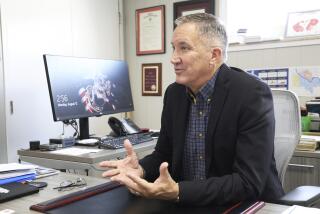OC HIGH: STUDENT NEWS AND VIEWS : Where There’s a Will in Schools, There’s a Prayer
- Share via
Even without a proposed constitutional amendment that would allow voluntary prayer in class, thousands of students across the nation are pressing their hands together in prayer at school.
They are the high school students involved in voluntary religious clubs--an overwhelming majority of which are Christian. The clubs offer a place where students can express their faith in their free time.
The National Fellowship of Christian Athletes, one of the more popular national religious groups on campus, says it has an all-time high of 5,278 school affiliates--mostly high schools--up nearly 50% over 1992.
And a group called Campus Crusade for Christ says it reaches 250,000 junior high and high school students nationwide.
The clubs got a boost in 1990, when the Supreme Court upheld the constitutionality of the 1984 Equal Access Act. The act says religious clubs must be treated like any other extracurricular clubs on secondary school campuses: Christian clubs must be allowed if chess clubs are.
In the 1990 case, the court sent a message to holdout school districts across the nation that they must allow the clubs, noting “the crucial difference between government speech endorsing religion, which the (Constitution) forbids, and private speech endorsing religion, which the (Constitution) protect(s).”
Some believe that the presence of religion on campus should be an integral part of the day--not just in clubs.
Republican lawmakers have vowed to pursue a school prayer amendment, hoping to get it on the books by the summer. The measure, introduced by Rep. Ernest Istook Jr. (R-Okla.), would allow--but not require--school districts to conduct teacher-led prayer. Under the proposal, students who don’t want to pray can sit silently or leave the room. President Clinton has opposed the Republican plan, although he says he would endorse a moment of silence at schools.
The Freedom Forum First Amendment Center at Vanderbilt University in Nashville, Tenn., argues in a recently released study that schools should teach students about religion, but not indoctrinate them.
“There’s no way to teach United States history adequately without teaching about our religious roots,” says the study’s author, religious scholar Charles C. Haynes. “The same is true in world history. A student who graduates from high school and doesn’t know anything about Islam is not prepared to live in the modern world. Many of the world’s conflicts are rooted in religious differences.
“Fighting over whether we can have a 30-second nondenominational prayer diverts attention from the real issues. Teaching about religion needs to be there.”
More to Read
Sign up for Essential California
The most important California stories and recommendations in your inbox every morning.
You may occasionally receive promotional content from the Los Angeles Times.













